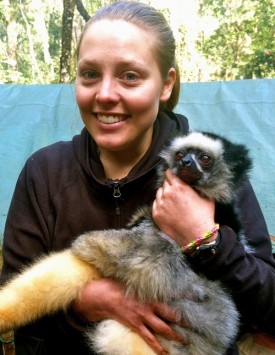Dr. Meredith Semel
PHD FELLOW GRADUATE | Global Change Center
VT Graduate May 2022 • Biological Sciences
Advisor: Dr. Ignacio Moore
makeeley08@gmail.com • CV

Meredith Semel defended her PhD dissertation in April 2022. Meredith studied the movement behavior of endangered golden-crowned sifakas to inform conservation efforts for the species, novel technology development to aid in remote tracking, and education and outreach initiatives for communities in Madagascar. In fall 2022, Dr. Semel started a new position as assistant professor of Biology at the University of Minnesota, Morris.
Meredith joined the Moore lab in the fall of 2016 as a PhD student. Her primary research focus was on the impact of habitat loss and human encroachment on the conservation of the critically endangered golden-crowned sifaka (Propithecus tattersalli). Prior to starting graduate school, Meredith received her B.S. in Biological Sciences from Queens University of Charlotte in 2014. While at Queens, she sought opportunities to enhance her knowledge of field research and how cultural differences impact worldwide conservation successes. After graduating, Meredith gained additional knowledge of the amalgamation of wildlife conservation and indigenous people.
She worked as a research assistant at Lajuma Research Centre in South Africa’s Soutpansberg Mountains studying the behavioral ecology of leopard and baboon interactions. Meredith then went on to work in Tsinjoarivo, Madagascar to examine the feeding ecology of two rainforest lemur species. During her time at Tsinjoarivo, Meredith witnessed the necessity of compromise between local individuals, visiting and Malagasy scientists, and government officials to ensure the successful conservation of not only Madagascar’s wildlife but also its people. Her experiences inspired her to pursue research that provides insights into the way lemurs cope with the independent as well as synergistic effects of habitat fragmentation, resource limitation, and an ever-increasing human population.
While at VT, Meredith conducted four field seasons in northeastern Madagascar focusing on the ranging behavior, diet, and stress physiology of golden-crowned sifaka. During these field seasons she has formed lasting relationships with Malagasy NGOs + local community members, collected a tent full of lemur poop, and recently received funding to construct the Fanilo Outreach Center in Daraina, Madagascar. Meredith also worked with the Duke Lemur Center, which houses the largest colony of lemurs outside of Madagascar, to investigate the physiological health of their (~30) captive sifaka in regard to husbandry conditions. Lastly, Meredith worked with a team of engineers, computer scientists, biologists, and industrial designers from VT and JMU to design and construct novel proximity collars to remotely study the social behavior of lemurs (and other wildlife).
Meredith enjoyed the creative and collaborative environment of the IGC program and how the program fosters interdisciplinary protocols that incorporate ecological, economic, and political processes to maintain viable ecosystems and manage global threats. Being a fellow of the IGC program was instrumental in helping Meredith learn about the intricacies of maintaining effective collaborations with diverse teams, working alongside stakeholders, and effectively communicating her work to a broad audience. Specifically, IGC training allows fellows to critically evaluate the policy implications of their research and understand the true importance of teamwork when it comes to solving complex issues.
Last updated June 2025.
In the News
Of Love and Lemurs, VT Magazine Spring 2020




